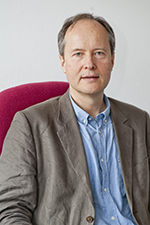 Since 2010, Dr. Jean-Francois Soussana is scientific director for environment at Inra, Paris, France. He obtained his PhD in plant physiology at USTL Montpellier in 1986 after a degree in agronomy. After becoming a senior scientist at Inra he led during 8 years an Inra research unit on grassland ecosystems and global change.
Since 2010, Dr. Jean-Francois Soussana is scientific director for environment at Inra, Paris, France. He obtained his PhD in plant physiology at USTL Montpellier in 1986 after a degree in agronomy. After becoming a senior scientist at Inra he led during 8 years an Inra research unit on grassland ecosystems and global change.
Since 1998, Dr. Soussana is member of the Working Group II of IPCC on Impacts, Adaptation and Vulnerability. He was Lead Author for the Third, Fourth and Fifth Assessment Reports in the field of agriculture, forests and ecosystems and shared the Nobel Prize for Peace in 2007. He has contributed to international research programs (GCTE, Global Change and Terrestrial Ecosystems; GCP, Global Carbon Project) and to scientific expertise for FAO. He has coordinated research projects on climate change and agriculture and currently leads a large European (FP7) project on livestock and climate change involving four continents. J-F Soussana has also chaired a national scientific committee on ‘Ecosystems and Sustainable Development’ for the French national research agency (ANR) and is currently chairing the scientific advisory board of the Joint Programming Initiative on Agriculture, Food Security and Climate Change (FACCE JPI, 21 countries). He also leads a group of the Global Research Alliance on agricultural greenhouse gases (36 countries) and an activity of the AgMIP international program on climate change impacts on agriculture. He currently chairs the scientific committee of the Third Global Conference on Climate Smart Agriculture.
Dr. Soussana has published over 130 refereed research papers in international journals as well as two books and a dozen book chapters. He has developed novel experimental and mathematical modelling approaches to the impacts of climate change on agro-ecosystems and food supply and to the role of agricultural management and biodiversity for the carbon and nitrogen cycles and for greenhouse gas emissions.
© The Open University
Rate and Review
Rate this audio
Review this audio
Log into OpenLearn to leave reviews and join in the conversation.
Audio reviews